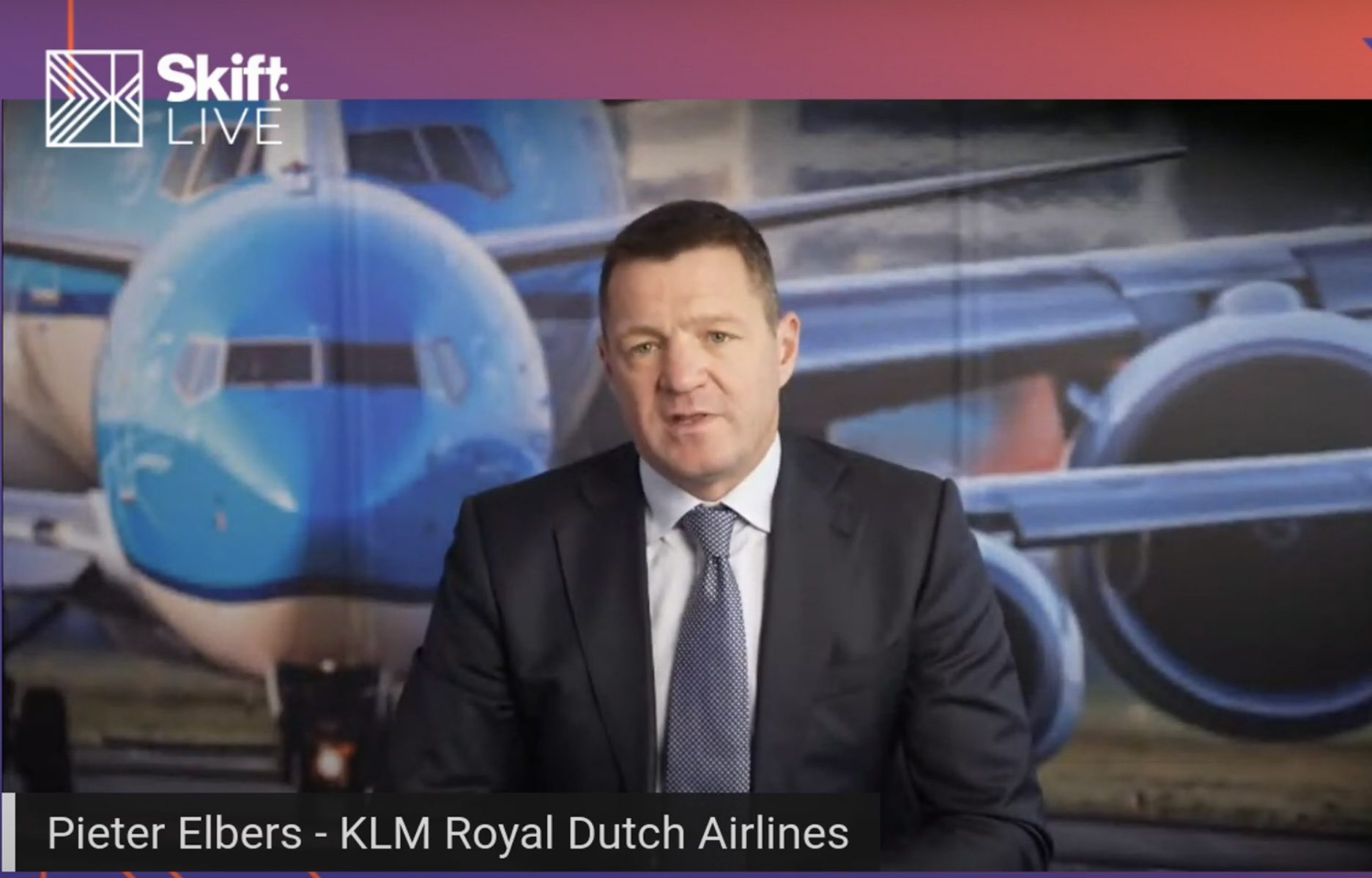Skift Take
Speaking at Skift Aviation Forum, Pieter Elbers says the world is on its way to recovering from the Covid-19 pandemic, but he tempers his optimism by saying the road ahead will be "bumpy."
On November 8, the first day that the U.S. reopened to vaccinated foreign travelers, KLM’s aircraft across the North Atlantic were 97 percent full, a remarkable statistic in the best of times but even more striking now, during a global pandemic, when planes plying international routes are on average about 60 percent full.
“This is a testimonial and a proof of the willingness of people to travel,” KLM CEO Pieter Elbers said at the Skift Aviation Forum on Wednesday. “It’s a demonstration of people wanting to get back in the air.”
The North Atlantic was the most important market for KLM before the pandemic,. The airline lacks a domestic market, as the Netherlands is too geographically small to sustain a large internal airline industry, so KLM makes its money by connecting passengers through its hub in Amsterdam. “It is the backbone of our long-haul network,” Elbers said.
A growing part of this travel is premium leisure, or leisure passengers buying premium-class fares for vacation travel. KLM is “in a good spot” to capture some of this demand, as its business cabins are relatively small, compared with its competitors’. But it offers more premium economy options than some of its competitors. KLM already had begun adding a premium-economy fare class to its flights before the pandemic, and. this work is picking up steam now that the recovery is underway, Elbers said.
Prior to the U.S. reopening, KLM had begun restoring its routes to the U.S., and most of its pre-pandemic destinations are back in service. The carrier now is working on adding frequency to its flights, and cargo helped keep KLM’s flights to the U.S. in business. But Elbers noted the road ahead will be “bumpy.”
“The world is on its way to recovery,” he said, but the recovery is likely to be “stop and go.” Some parts of the world are re-imposing restrictions, testing requirements, and quarantines in response to fresh surges of Covid-19. Asia remains largely shuttered, although Elbers is encouraged by recent moves in Japan, Thailand, South Korea, and Singapore to reopen, even if partially. China’s recovery is still “far away,” but Elbers said, “I stay optimistic.”
Business travel’s return is an open question, although Elbers noted European companies are sending workers back out on the road as vaccination rates improve in the continent. Most of the travel to the U.S. so far has been leisure, but small- and medium-size enterprises have resumed business travel across the Atlantic, if modestly. “We need to wait a little on long-haul [business] traffic,” he said.
It’s not just the nature of travel that the Covid-19 pandemic has changed. The way airlines view their role in climate change also has changed. Elbers pointed to KLM’s years-long efforts to mitigate its carbon emissions, but said the trend toward more environmentally sustainable airlines has accelerated. KLM is stepping up the amount of sustainable aviation fuel (SAF) it buys but acknowledges it cannot go it alone. The International Air Transport Association (IATA) recently adopted more stringent carbon-emissions goals, and Elbers believes that with the airlines acting in concert, the supply of SAFs, now minimal, will grow in response to demand.
But airlines aren’t alone in the fight. Manufacturers, governments, and airlines must work together to reduce air travel’s carbon footprint. Governments have a role in mandating more SAF production and in streamlining air traffic control to allow more efficient flight paths. Manufacturers should be more aggressive in developing new propulsion systems. And airlines should accelerate fleet transformation to retire less efficient aircraft types. “We need to address all the different levers to make progress,” he said.
KLM has done so in recent years, with the introduction of more efficient regional jets, the Embraer 195-E2 and new Boeing 787s for its long-haul fleet, while retiring older Boeing 747s. The carrier still is deciding on which next-generation aircraft will replace its fleet of aging Boeing 737s, although Elbers declined to tip his hand.
Electric aircraft, like the “air taxis” American Airlines, United Airlines, and Virgin Atlantic, among others, have ordered, will play a role in reducing airlines’ carbon footprints, but the technology as it is now is still at too early a stage to make a significant impact. “It’s a start,” Elbers said.
The Daily Newsletter
Our daily coverage of the global travel industry. Written by editors and analysts from across Skift’s brands.
Have a confidential tip for Skift? Get in touch
Tags: airlines, klm, skift aviation forum 2021, skift live, transatlantic travel
Photo credit: KLM CEO Pieter Elbers speaking at Skift Aviation Forum in November 2021. Skift
